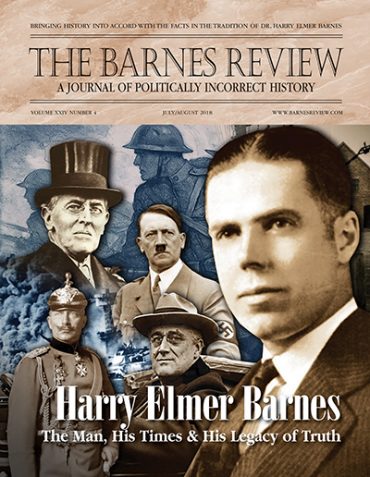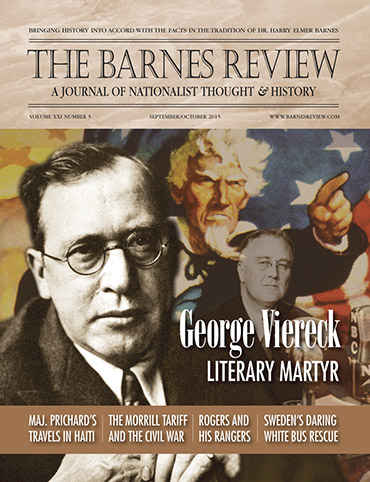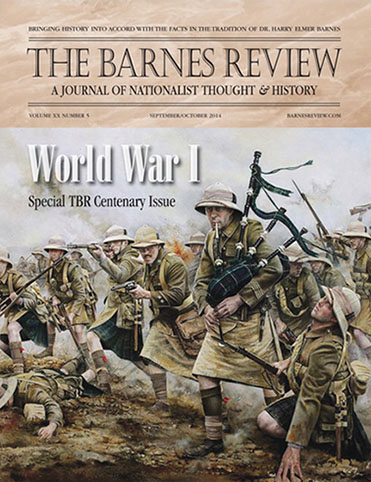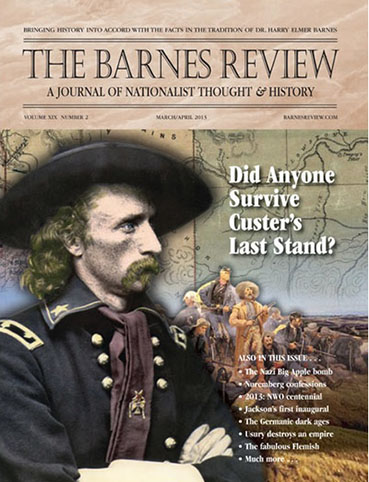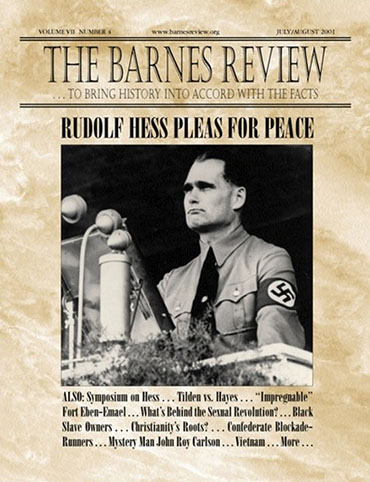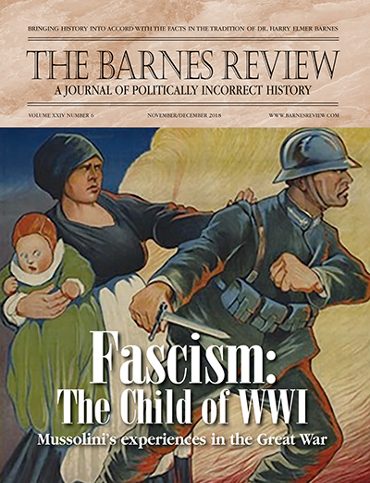
The Barnes Review November/December 2018
$5.00 – $10.00
The Barnes Review
A JOURNAL OF POLITICALLY INCORRECT HISTORY
NOVEMBER/DECEMBER 2018 ❖ VOLUME XXIV ❖ NUMBER 6
TABLE OF CONTENTS
FASCISM: CHILD OF WORLD WAR I: BENITO MUSSOLINI’S EXPERIENCES
BARON FRANZ VON WERRA’S SAGA
INSIDE THE I.G. FARBEN TRIAL
THE CENSORED WWII LEGACY OF NATHAN BEDFORD FORREST III
BLACK REBEL SOLDIERS SNUBBED
FDR, PEARL HARBOR & DR. BARNES
THE BATTLE FOR ALASKA
TOKYO ROSE: WAS SHE A TRAITOR?
WHITE SLAVE OF THE NOOTKA
THE HAIGHT SHOOTING GLOVE
THE MILITARIZATION OF SPACE
- Description
- Additional information
Description
The Barnes Review
A JOURNAL OF POLITICALLY INCORRECT HISTORY
NOVEMBER/DECEMBER 2018 ❖ VOLUME XXIV ❖ NUMBER 6
TABLE OF CONTENTS
FASCISM: CHILD OF WORLD WAR I: BENITO MUSSOLINI’S EXPERIENCES
BY MARC ROLAND. The political philosophy of Benito Mussolini—which inspired German National Socialism and Adolf Hitler—was deeply rooted in his experiences as a heroic soldier in World War I and his opposition to the evils of Marxism he saw growing in Italy. Once a devout Marxist, Mussolini overcame that brainwashing.
BARON FRANZ VON WERRA’S SAGA
BY DR. EDWARD DEVRIES. We’ve all heard of the “Great Escape” of Allied soldiers from Stalag Luft III during World War II. But few of us have heard of the escape of Hauptmann Franz von Werra, a German pilot who became “the one who got away”—the only German officer to escape from his Allied jailers. Here is his saga.
INSIDE THE I.G. FARBEN TRIAL
BY JOHN WEAR, J.D. Just as any patriotic business owners would, the owners of the I.G. Farben industrial company helped their nation during wartime. After Germany lost the war, however, I.G. Farben’s owners and employees were considered war criminals and brought to trial.
THE CENSORED WWII LEGACY OF NATHAN BEDFORD FORREST III
BY DR. EDWARD DEVRIES. The first Allied general to be killed in World War II, Gen. Nathan Bedford Forrest III gave his life to save his men. His legacy is censored, however, due to the politically incorrect legacy of his great-grandfather.
BLACK REBEL SOLDIERS SNUBBED
BY DR. EDWARD DEVRIES. Lt. Col. Edward Kennedy always loved history. When asked to come up with a military display for Black History month, he decided to honor those blacks who fought for the Confederacy. This is when trouble started.
FDR, PEARL HARBOR & DR. BARNES
BY ANTONIUS J. PATRICK. Twenty-five years after Pearl Harbor, Dr. Harry Elmer Barnes published his analysis of the attack, blaming FDR for orchestrating the attack to get the U.S. into the war. To this day, Barnes’s study cannot be refuted.
THE BATTLE FOR ALASKA
BY DR. EDWARD DEVRIES. They were the only battles of World War II fought on U.S. soil. But few people know the Japanese overran and occupied two strategic islands in the Aleutians.
TOKYO ROSE: WAS SHE A TRAITOR?
BY DR. EDWARD DEVRIES. Her name is synonymous with “traitor,” but Iva Toguri d’Aquino, aka “Tokyo Rose,” though she was charged, convicted and imprisoned, did not deserve her punishment.
WHITE SLAVE OF THE NOOTKA
BY JOHN TIFFANY. We often hear of the white perpetrators of slavery—the shackling of blacks, American Indians and whomever else we can get our hands on. But here is the tale of a white man enslaved by red men of the northwest.
THE HAIGHT SHOOTING GLOVE
BY MICHAE L HEIDLER. During World War II, U.S. Navy Seabees performed vital construction work for American armed services, sometimes just yards from the enemy in tight quarters. But wielding a weapon in such an environment was difficult, hence the invention of the Haight glove gun.
THE MILITARIZATION OF SPACE
BY S.T. PATRICK. Recently, President Trump has suggested the formation of the U.S. Space Force, toying with the idea of militarizing space. This issue, we take a look back at Ronald Reagan’s laser-based Strategic Defense Initiative and the moral, financial and ethical ramifications.
Additional information
| TBR Back Issue | PDF Copy, Print Copy |
|---|



